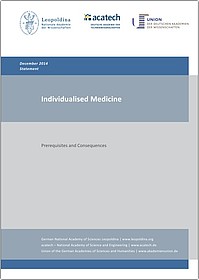National Recommendations
Individualised Medicine (2014)

Prerequisites and Consequences
(2014, 108 pages, 4 Figures, 4 Tables, ISBN: 978-3-8047-3342-8)
For centuries, empirical approaches have determined the medical treatment of people with illnesses. Groundbreaking progress in the life sciences and in the development of medical technology procedures have led to a significantly improved understanding, grounded in the natural sciences, of the causes and development of illnesses. Decoding the human genome was a milestone on the path to being able to diagnose and treat, and ultimately prevent, illnesses by taking a particular patient’s individual characteristics into account. There are several terms for this approach in medicine, such as Personalised or Individualised Medicine (which is used in this statement); other terms are Precision Medicine, Genomic Medicine and Stratified Medicine.
Individualised Medicine aims to improve the efficacy and quality of treatment by means of targeted prevention, systematic diagnostics and the use of tailored therapeutic procedures that are based on the needs of individual patients or patient groups. The goals of this approach include reducing adverse side effects and increasing the cost-effectiveness of healthcare over the long term.
Doctors have always taken the individual patient into consideration when determining what type of treatment to use; Individualised Medicine develops that practise further. Techniques (primarily molecular ones) for determining biological parameters or ‘biomarkers’ in a targeted way are increasingly being incorporated into the treatment process to precisely quantify and objectify patients’ individual biological characteristics.
Although more and more people are now ageing in good health, overall the number of chronic illnesses, which often occur in combination (multimorbidity), and the resulting treatment costs, are increasing significantly. Many common chronic conditions, such as rheumatic illnesses, cardiovascular conditions, diabetes mellitus and dementia, are influenced by numerous genes and environmental factors. For these disorders as well, disease-associated genetic variants and other biomarkers are increasingly being identified. Categorising patients precisely into therapy-relevant subgroups (stratification) is much more difficult in these cases.
Modern high-throughput bioanalytical methods, or ‘omics’ technologies, now make it possible to record a person’s entire genetic makeup (genome) and the programming of their genes (epigenome) as well as all their gene products, RNA (transcriptome) and proteins (proteome). It is, moreover, possible to determine the entire spectrum of metabolic products (metabolome) and to investigate the influence of the microorganisms that coexist with a human being (microbiome). Analysing the numerous data obtained from this and correlating that data with particular diseases or the effects of medical treatments is an enormous scientific challenge.
Genomic analyses are already being used to diagnose monogenic diseases, that is those caused by the mutation of single genes, as well as certain infectious diseases, for example immunodeficiency brought about by HIV. Tumour therapy is also currently undergoing a fundamental transformation. Tumours are primarily the result of genetic changes in body cells. A deeper understanding of the molecular mechanisms of the genesis of numerous types of tumours has led to a new classification of tumours and makes it possible to develop molecular tumour diagnostics and targeted therapeutic agents based upon those diagnostic approaches. It is becoming evident that the use of these therapies is associated with fewer side effects than conventional treatment methods.
Medical progress is significantly increasing the amount of disease-relevant patient data and the number of treatment options that are available. Among the greatest associated challenges are standardising and securing these complex data and deriving reliable results and practical options from them. The latter must be transparent and comprehensible for patients, attending doctors and scientists working in medical research. Individualised Medicine thus requires the integration of new, particularly multi-layered organisational processes into existing healthcare structures.
This Statement analyses the potential of Individualised medicine for further development and addresses challenges associated with its implementation.

Elmar König
Head of Department Science – Policy – Society, Head of Berlin Office
| Phone | 030 203 8997 - 865 |
| Fax | |
| elmar.koenig (at)leopoldina.org |
